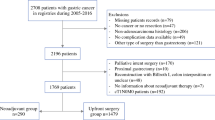Abstract
Background
Whether to administer surgical or non-surgical treatments (radiation or chemoradiation therapies) for the initial management of hypopharyngeal cancer (HPC) remains a topic of debate. Herein, we explored the differences between the two approaches in terms of oncological and functional outcomes in 332 HPC patients.
Methods
The primary endpoint was survival probability; secondary outcomes included post-treatment speech and swallowing functions and necessity of additional surgical procedures for salvage or complication management. Cox proportional hazard models using clinical variables were constructed to identify significant factors.
Results
The 2- and 5-year overall survival (OS) rates in all patients were 64.9 and 40.9 %, respectively. In early-stage HPC patients (N = 52), initial surgery ± radiation therapy (RT) or RT alone yielded similar oncological (60 % 5-year OS rate) and functional outcomes. As for resectable advanced-stage cancers (N = 177), initial surgery ± RT/chemoradiation therapy (SRC) and initial concurrent chemoradiation therapy (iCRT) resulted in similar 45–50 % 5-year OS rates. After sacrificing the larynx, 60 % of SRC patients recovered their speaking ability through voice prosthesis, which was less than the rate for iCRT patients (76.6 %; p = 0.008). Additional surgical interventions were required in 28.0–28.6 % of patients in both groups; however, 60 % of patients undergoing additional surgery in the iCRT group received multiple (two or more) surgical interventions (p = 0.029).
Conclusions
Our data revealed similar oncological outcomes, but different functional outcomes, between initial surgical and non-surgical treatments for HPC. In resectable advanced-stage HPC, iCRT resulted in better verbal communication outcomes than SRC; however, more iCRT patients required multiple surgical interventions during clinical courses.

Similar content being viewed by others
References
Cooper JS, Porter K, Mallin K, et al. National Cancer Database report on cancer of the head and neck: 10-year update. Head Neck. 2009;31:748–58.
Qian W, Zhu G, Wang Y, et al. Multi-modality management for loco-regionally advanced laryngeal and hypopharyngeal cancer: balancing the benefit of efficacy and functional preservation. Med Oncol. 2014;31:178.
Vandersteen C, Benezery K, Chamorey E, et al. Contemporary therapeutic management of locally advanced hypopharyngeal cancer: oncologic and functional outcomes: a report on 100 cases. Acta Otolaryngol. 2015;135:193–200.
Takes RP, Strojan P, Silver CE, et al. Current trends in initial management of hypopharyngeal cancer: the declining use of open surgery. Head Neck. 2012;34:270–81.
Kuo P, Chen MM, Decker RH, Yarbrough WG, Judson BL. Hypopharyngeal cancer incidence, treatment, and survival: temporal trends in the United States. Laryngoscope. 2014;124:2064–9.
Ganly I, Patel S, Matsuo J, et al. Postoperative complications of salvage total laryngectomy. Cancer. 2005;103:2073–81.
Klozar J, Cada Z, Koslabova E. Complications of total laryngectomy in the era of chemoradiation. Eur Arch Otorhinolaryngol. 2012;269:289–93.
Chen LY, Huang CC, Tsou YA, Bau DT, Tsai MH. Prognostic factor of severe complications in patients with hypopharyngeal cancer with primary concurrent chemoradiotherapy. Anticancer Res. 2015;35:1735–41.
Wulff NB, Kristensen CA, Andersen E, Charabi B, Sorensen CH, Homoe P. Risk factors for postoperative complications after total laryngectomy following radiotherapy or chemoradiation: a 10-year retrospective longitudinal study in Eastern Denmark. Clin Otolaryngol. 2015. doi:10.1111/coa.12443.
Xu B, Boero IJ, Hwang L, et al. Aspiration pneumonia after concurrent chemoradiotherapy for head and neck cancer. Cancer. 2015;121:1303–11.
Martin A, Jackel MC, Christiansen H, Mahmoodzada M, Kron M, Steiner W. Organ preserving transoral laser microsurgery for cancer of the hypopharynx. Laryngoscope. 2008;118:398–402.
Karatzanis AD, Psychogios G, Waldfahrer F, et al. T1 and T2 hypopharyngeal cancer treatment with laser microsurgery. J Surg Oncol. 2010;102:27–33.
Suarez C, Rodrigo JP, Silver CE, et al. Laser surgery for early to moderately advanced glottic, supraglottic, and hypopharyngeal cancers. Head Neck. 2012;34:1028–35.
Pfister DG, Ang KK, Brizel DM, et al. Head and neck cancers. J Natl Compr Canc Netw. 2011;9:596–650.
Kim JW, Kim MS, Kim SH, et al. Definitive chemoradiotherapy versus surgery followed by adjuvant radiotherapy in resectable stage III/IV hypopharyngeal cancer. Cancer Res Treat. 2015. doi:10.4143/crt.2014.340.
Edge SB, Compton CC. The American Joint Committee on Cancer: the 7th edition of the AJCC cancer staging manual and the future of TNM. Ann Surg Oncol. 2010;17:1471–4.
Newman JR, Connolly TM, Illing EA, Kilgore ML, Locher JL, Carroll WR. Survival trends in hypopharyngeal cancer: a population-based review. Laryngoscope. 2015;125:624–9.
Oken MM, Creech RH, Tormey DC, et al. Toxicity and response criteria of the Eastern Cooperative Oncology Group. Am J Clin Oncol. 1982;5:649–55.
Lefebvre JL, Chevalier D, Luboinski B, Kirkpatrick A, Collette L, Sahmoud T. Larynx preservation in pyriform sinus cancer: preliminary results of a European Organization for Research and Treatment of Cancer phase III trial. EORTC Head and Neck Cancer Cooperative Group. J Natl Cancer Inst. 1996;88:890–9.
Robertson SM, Yeo JC, Dunnet C, Young D, Mackenzie K. Voice, swallowing, and quality of life after total laryngectomy: results of the west of Scotland laryngectomy audit. Head Neck. 2012;34:59–65.
Polat B, Orhan KS, Kesimli MC, Gorgulu Y, Ulusan M, Deger K. The effects of indwelling voice prosthesis on the quality of life, depressive symptoms, and self-esteem in patients with total laryngectomy. Eur Arch Otorhinolaryngol. 2015;272(11):3431–7.
Finizia C, Bergman B. Health-related quality of life in patients with laryngeal cancer: a post-treatment comparison of different modes of communication. Laryngoscope. 2001;111:918–23.
Acknowledgment
This study was supported by the National Research Foundation, Grant Numbers 2012R1A1A2040866, 2014R1A1A2055006, and 2015R1D1A1A09056771 (Ministry of Education, Science and Technology, Korea).
Disclosure
Jeon Yeob Jang, Eun-Hye Kim, Jungkyu Cho, Jae-Hoon Jung, Dongryul Oh, Yong Chan Ahn, Young-Ik Son, and Han-Sin Jeong have no conflicts of interest to declare.
Author information
Authors and Affiliations
Corresponding author
Electronic supplementary material
Below is the link to the electronic supplementary material.
Rights and permissions
About this article
Cite this article
Jang, J.Y., Kim, EH., Cho, J. et al. Comparison of Oncological and Functional Outcomes between Initial Surgical versus Non-Surgical Treatments for Hypopharyngeal Cancer. Ann Surg Oncol 23, 2054–2061 (2016). https://doi.org/10.1245/s10434-016-5088-4
Received:
Published:
Issue Date:
DOI: https://doi.org/10.1245/s10434-016-5088-4




